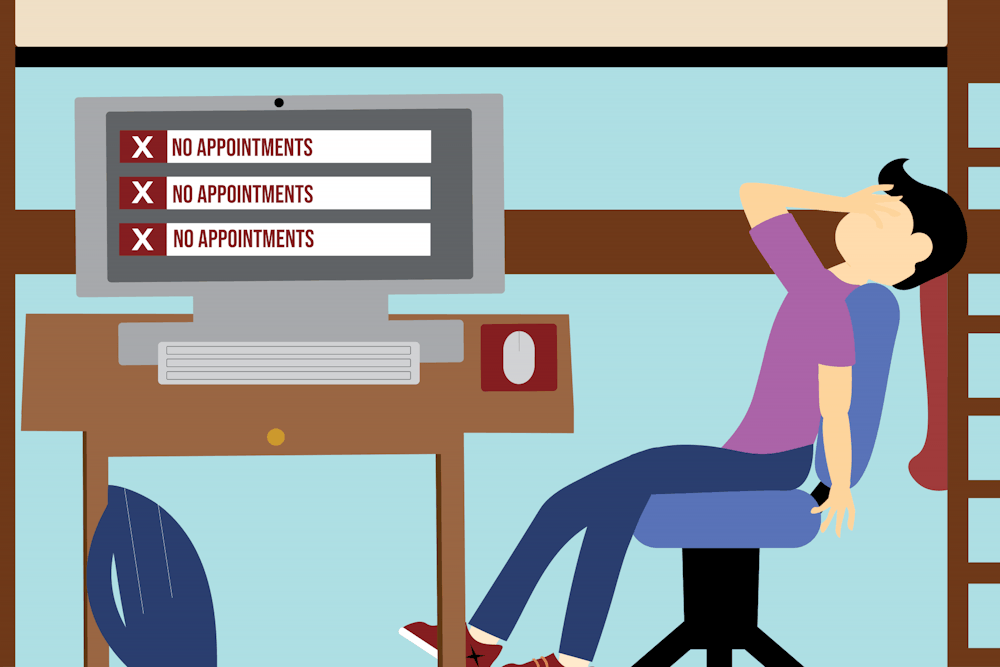The Daily Gamecock surveyed 40 students to ask about the status of their mental health. Students said they have found ways to cope with their mental health but believe the university could better address their mental health concerns and needs.
For some students, there were mental health challenges that they were not prepared for. One of the biggest unexpected issues was maintaining a social life while still trying to prioritize self-care.
Emerson Taylor, a first-year psychology and studio art student, said she had the wrong ideas about the way she might face social struggles at college.
“I was really worried about being alone, but that hasn’t been the struggle. I feel like, if anything, the struggle is that I get socially drained too easily, and I need to spend more time alone,” Taylor said.
Other students similarly felt stressed trying to manage their time. Fourth-year geography and global studies student Jacquelin Burnett said she found difficulty in striking a balance between school, social and alone time.
“When I’m taking 18 or 21 credit hours and also trying to fit in clubs or organizations, that doesn’t leave as much time to focus on myself,” Burnett said.

While students shared mixed opinions about whether or not their mental health has declined, many had similar struggles with homesickness. Burnett said she is struggling with homesickness even as she nears graduation.
“Honestly, I think it’s gotten harder the longer I’ve been here because I realized I’m gonna graduate and move away and not see my family as much,” Burnett said.
Christina Farmer, a fourth-year hospitality management student, said feeling stuck on campus made her homesickness and adaptation to campus living worse.
“I didn’t have a car when I first came and so that was like really hard because I couldn’t like leave campus and I just felt stuck here,” Farmer said.
Despite evident battles with homesickness, USC students said they learned to cope. Julia Ressa, a fourth-year psychology student, said her parents played a big role in helping her overcome any homesickness that she experienced.
“My parents were really good with scheduling visits for me, so that was really nice. And then just bringing a little piece of home, like my mom would make food for me,” Ressa said.
To help with some of the struggles students are having, Student Health Services currently provides resources such as one-on-one and group counseling, but many USC students said they or someone they knew struggled to get appointments and receive "quality" help at the Center for Health and Well-Being.
Ethney Dosenbach, a third-year English student, had attempted to receive help from the health center but was turned away due to a lack of availability.
"They advertise 10 free counseling sessions, but it's really not," Dosenbach said. "You have to fight tooth and nail to get your own appointment.”
First-year geology student Emma Driller said she’s heard others complain that the standard of help received from the university was "subpar."
“I’ve known multiple stories where they went and reached out, and that was available to them, but the help that they received was horrible,” Driller said.
Some USC students suggested ways they thought the university could best utilize the $1 million dedicated from Imagine Carolina to health services and resources on campus. Third-year retail management student Sarah Krebs said the university should prioritize providing better education about mental health to students. One way it could do this is by handing out informative pamphlets, she said.
"I think it’s important for everyone to learn about it rather than having students go off and learn about it on their own," Krebs said.
Others, like Taylor, said improvements could be made with the number of free counseling sessions offered by the university.
“I know we only have 10 free appointments, which for people who would regularly go to therapy, that might not be sufficient,” Taylor said.
Driller said USC should better train counselors at the Center for Health and Well-Being so they are more equipped to help emotionally distressed students.
“Even just kindness helps so much,” Driller said. "And so better training, spending on better training — and free puppies."

